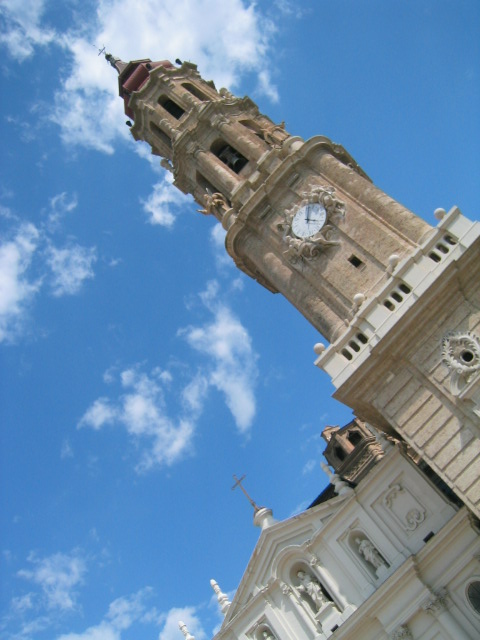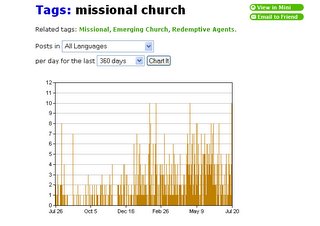Suburban churches sucking the life out of a small town Monday, July 31, 2006 |
What's most interesting is that the members of the churches don't even live in Stafford! So, not only does the city have to accomodate the churches, they also don't get any benefit from having members of the churches living in the city.
Where is the idea of "shalom" in all this? Where is the concept of "seeking the welfare (peace, prosperity) of the city?" (Jeremiah 29) Why do churches think that they can just rape and pillage resources in order to build their empires? Why don't more churches have a value for being a blessing to their neighborhoods, communities, and cities?
I'm not saying that the central goal here is to help this city make some money. But it is sad that a community like this cannot even sustain its own infrastructure because of the unintended, yet powerful, affects of the self-absorbed decisions of commuter, suburban churches. How can these churches teach and equip their people for sustainable and reproducible mission/blessing in their neighborhoods when the churches themselves cannot live out sustainable and reproducible mission/blessing in their own neighborhood?
2 of my favorite quotes:
"If you can't find religion in Stafford, Texas, you ain't looking hard enough."
Willis said he asked the last six applicants why they wanted to build a church in Stafford. "Every one of them said they prayed about it, and God said to come here," he said. "I can't compete with that, so here we are."
Churches Putting Town Out of Business
Scarcella is mayor of this Houston-area community, which has 51 churches and other religious institutions packed into its 7 square miles.
With some 300 undeveloped, potentially revenue-producing acres left in Stafford, officials are scrambling to find a legal way to keep more tax-exempt churches from building here.
"With federal laws, you can't just say, 'We're not going to have any more churches,' " Scarcella said. "We respect the Constitution, but 51 of anything is too much."
Stafford, population 19,227, is the largest city in Texas without a property tax, and it depends on sales taxes and business fees for revenue. Nonprofits have been attracted by its rapid growth and minimal deed restrictions. "It's thrown everything out of balance, plus providing zero revenue. Somebody's got to pay for police, fire and schools," City Councilman Cecil Willis said.
In 2003, around the time the 45th church settled in, city leaders began looking for a way to slow the pace of construction. Public meetings were held; "we had people of different religions attending, people in their religious garb, Buddhists in their orange gowns and whatever else, talking about this very openly," Scarcella said.
An ordinance eventually passed that required those who wanted to build a church - and other public gathering places, such as bowling alleys and community halls - to undergo a rigorous review process and obtain City Council approval.
Before the ordinance, "you could pretty much come in here and say, 'I want to open up a church,' and I'd say, 'OK,' " said Gene Bane, the city's director of building permits.
In his office is a large map of Stafford that is dotted with round yellow stickers, each dot denoting a church or religious facility. In some parts of town, the dots are so close together they nearly meld into a big yellow glob.
In one quarter-mile section near the city center, parishioners can choose among 17 churches. There are three small churches in the Quail Ridge Plaza shopping center, and three large brick churches on the street behind it. Down the road, the Evangelical Formosan Church is tucked behind a muffler shop.
"If you can't find religion in Stafford, Texas, you ain't looking hard enough," Bane said.
There are no synagogues in Stafford, but there are religious facilities for Buddhists, Muslims, Chinese Baptists, Filipino Baptists, Spanish-speaking Baptists, and "every other variety of Christian you can imagine," Scarcella said.
"As best as we've been able to determine, the overwhelming majority of people who attend here don't even live in Stafford; they're coming from everywhere else," Willis said. Elsewhere includes Houston, about 15 miles northeast, and nearby Sugar Land.
"I don't hate God. I'm not against America and apple pie," Willis said. "We just have to protect what's left for commercial development."
Lawyers researching ways to stop church growth here will report back to city leaders in about six weeks, Scarcella said.
Lola Onita, assistant pastor at Jesus House Texas, said churches should be allowed to spread unfettered in a country that respects religious freedom. "People need a place to worship and hear the word of God," she said.
But Nilda Martinez, who owns a flower shop between two churches, has had enough. "The churches, they're everywhere here," she said. "There are too many; the city should control it. It hurts the city when you don't have enough businesses paying taxes."
Willis said he asked the last six applicants why they wanted to build a church in Stafford. "Every one of them said they prayed about it, and God said to come here," he said. "I can't compete with that, so here we are."



